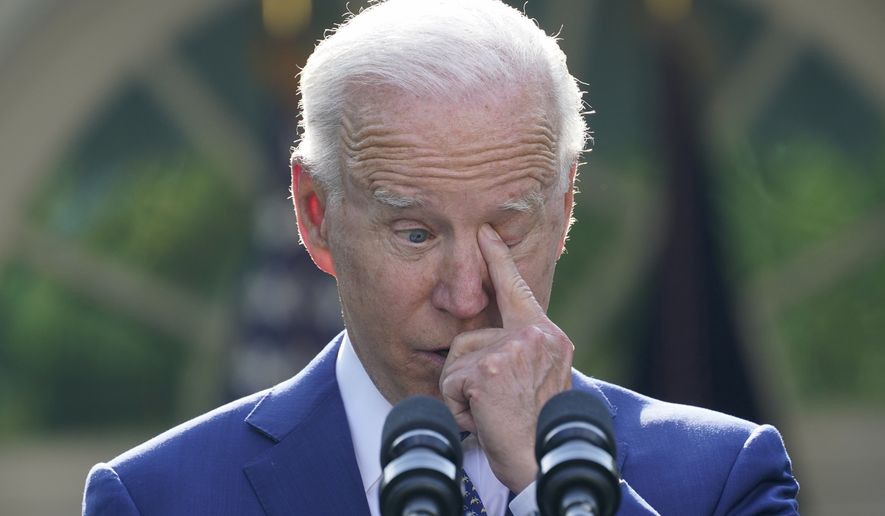President Biden’s $1.2 trillion infrastructure package does not fully pay for all the spending it proposes, as promised by the White House, according to a review released Thursday by the Congressional Budget Office.
The CBO scoring could prove a major political headache for Mr. Biden at a delicate time for his agenda. The Senate is beginning debate on the bipartisan plan, the centerpiece of the president’s pitch that he can make progress in a closely divided capital. The president is trying to keep enough Republicans on board for the infrastructure deal to prevent a Senate filibuster and enact it into law.
The Senate, with the traditional August recess looming, was considering amendments to the bill Thursday. Majority Leader Charles E. Schumer, New York Democrat, has said he wants to pass the measure early next week, but it was not immediately clear whether the CBO verdict would alter that schedule.
The CBO, a nonpartisan agency that analyzes the economic impact of federal legislation, found that the infrastructure bill would add $256 billion to the national deficit over the next decade. The sum is more than half of the $550 billion in new spending that lawmakers and the White House have proposed within the deal.
The results pose a blow to the infrastructure deal, crafted by Mr. Biden and a bipartisan group of 10 senators. The deal has received strong bipartisan support, in part because of claims that it can be fully funded without raising taxes. The overall package includes huge pots of money for roads, bridges, public transportation, new water pipes and expanded internet access for remote, rural Americans.
“This is paid for. This is not going to raise taxes on people,” Sen. Mitt Romney, Utah Republican, said Monday when the full package was made public. “This is a bill which is paid for, and it gives the American people something that they desperately need, and that is an upgrade in our infrastructure.”
Even before making that promise, those helping craft the deal were struggling to find creative sources of revenue for the whole spending proposal.
Lawmakers initially proposed narrowing the “gap” between taxes paid and taxes owed by giving the IRS $40 billion more for enforcement. Mr. Romney and others said hunting down uncollected taxes could generate at least $100 billion.
The plan, though, quickly proved controversial. Sen. Ted Cruz, Texas Republican, and other conservatives raised the specter of what proved to be a major scandal during the Obama administration. They suggested that the IRS could hound taxpayers or explicitly target right-wing political groups.
The IRS provision was scrapped, and the White House and Senate negotiators scrambled to find other ways to finance the bill. Lawmakers settled on an intricate series of budgetary changes — “gimmicks” in the eyes of critics — to balance the books.
The infrastructure package as now written would “repurpose” more than $205 billion of unused funds from Mr. Biden’s COVID-19 emergency relief plan and take $53 billion from unemployment benefits that states have refused to accept in the face of tight labor markets.
The drafters propose raising $50 billion by delaying a Trump-era rule on Medicare rebates, bringing in $87 billion from the sales of space on the wireless radio wave spectrum, and generating $30 billion by applying fees and information-reporting requirements on cryptocurrency.
Lawmakers also said at least $60 billion would come from the economic growth resulting from infrastructure projects.
The math, however, did not add up in the eyes of the nonpartisan CBO analysts. The report could derail the entire package, which will require the support of at least 10 Republicans in the Senate to pass.
Mr. Romney pushed back on the CBO’s analysis, arguing the agency was not taking into account all the funding mechanisms in the bill.
“As expected, the CBO confirms half the bill is paid for with new revenue,” he said. “The other half is paid for with savings and other revenue [unused unemployment insurance and coronavirus relief funds] that don’t score under their rules, but they are real dollars.”
Regardless, some Republicans are already announcing the opposition based on the CBO analysis.
“This is absolutely unacceptable, especially at a time when Montana families are already dealing with soaring inflation and skyrocketing prices on everything from gas to groceries,” said Sen. Steve Daines, Montana Republican.
Sen. Rick Scott, Florida Republican, said the CBO deficit projection made the entire infrastructure package unworkable in his eyes.
“I fully support spending on infrastructure,” Mr. Scott said in a statement, but “we cannot afford this reckless spending.”
Complicating matters is that Democratic leaders have pledged to move the infrastructure package in tandem with a $3.5 trillion social welfare bill.
The bigger bill, pitched as “human infrastructure,” contains a slew of liberal priorities, including climate change regulations, anti-poverty initiatives and amnesty for illegal immigrants.
Because Republican support is unlikely, the only hope for its passage is via budget reconciliation. The process allows spending bills to avert the Senate‘s 60-vote filibuster threshold and pass by a simple majority of 51 votes.
“The Democrats are taking our country in the wrong direction and heaping huge amounts of debt on future generations,” Mr. Daines said.
• Haris Alic can be reached at halic@washingtontimes.com.




Please read our comment policy before commenting.